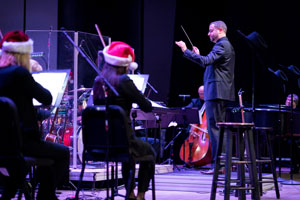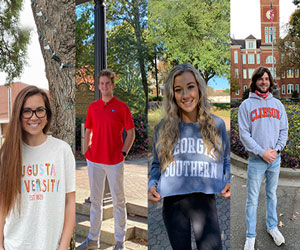 Four university freshmen from Columbia County share their experiences of going off to college during the coronavirus pandemic.
Four university freshmen from Columbia County share their experiences of going off to college during the coronavirus pandemic.
The first year of college can be a time of excitement, anticipation, adventure, challenge, trepidation, self-discovery and personal growth all at once.
For the college Class of 2024, however, the worldwide coronavirus pandemic added one more layer to these students’ introduction to campus life. Not only did they have to finish their senior year of high school online. They also had to start their freshman year of college amid the uncertainty, rules and regulations of the pandemic.
These freshmen approached their first semester with strength and resilience, however, to make the most of their college experience. If life as we once knew it hasn’t returned by the end of their freshman year, here’s hoping they can start their sophomore year under more normal circumstances.
In this Q&A, which has been edited for space and clarity, they described what life on campus was like during their first semester of college.
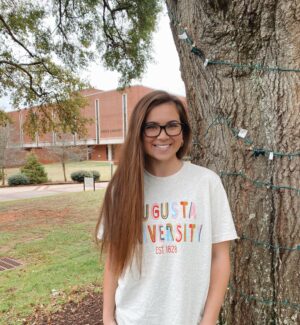 Sara Blake Tully
Sara Blake Tully
Augusta University freshman, business major
Did covid influence where you decided to go to college?
Covid didn’t affect my decision to go to AU. I want to transfer to UGA next year, but with everything being so crazy, I’m glad I decided to stay home and live at my parents’ house.
What kind of rules or restrictions did you have to follow on campus because of covid?
We had to wear masks in every building we went in. If we were walking outside, we could bring our masks down. The majority of time that I was on campus, I had to have my mask on.
In the classrooms, the chairs and desks and tables were set up six feet apart. There were a lot less people in class than usual. At the food court, we had to stand in line six feet apart. We had tables, but only a limited number of people could sit at each table.
What happened when someone tested positive for covid-19? And did you have to isolate or quarantine for any reason?
I am not quite sure what would happen if a student tests positive for covid-19, but I did not have to quarantine or isolate for any reason.
Were your classes online or in-person?
I had two online classes and two in-person classes. I went to campus every morning. I took biology and history online, and public speaking and pre-calculus in-person. For biology, we got handouts to answer questions that went along with videos.
Did finishing high school online help you adjust to online classes in college?
It kind of helped. When we first went online in high school, no one knew what to do at first. It’s different now. Teachers are better at doing online lectures and working with all of the technology.
Have you had to adjust your learning style because of online classes?
Online learning for me is a lot harder than in-person because I can’t grasp the information as well. I had to study more and change my focus. It was all on school. I was juggling two things at once with online and in-person classes.
What were you most looking forward to about going to college?
Getting a fresh start, being more independent and meeting new people.
What was reality like?
It was very isolated because of the masks. It wasn’t as personable. You couldn’t meet people in class. You couldn’t really talk because of the masks. It made things a little lonelier since most of my friends went off to school. Corona didn’t make it any easier.
I rushed, though, and joined a sorority – ADPi. It was supposed to be in-person, but we did it over Zoom. It was awkward because you’re talking over a computer screen. Sometimes there were awkward silences because of the internet connection.
We had chapter meetings over Zoom, but we did some sisterhood events. We wore masks for them. We had to have a limited number of people at the events, but I could still hang out with some of the girls. We did things outside. We would go to a park or have a picnic. We social distanced.
How do you date during covid?
(laughing) You don’t. it’s really difficult to do that.
What has been the biggest disappointment or challenge about going to college during covid?
It’s not getting the full college experience. I still went to campus, which I loved. But it was not the same because there was hardly anyone there.
Was anything better than you expected?
Deciding to stay home for school has been better than I thought. It’s been nice living at home. It’s been a good stress reliever from school.
Ten, 15 or 20 years from now, how will you look back on this experience?
I’ll definitely have many stories I can tell my kids. And it has been character building. I had to learn how to interact with people and teachers differently. I have learned not to take anything for granted. I know everyone wants to go back to how life was before corona.
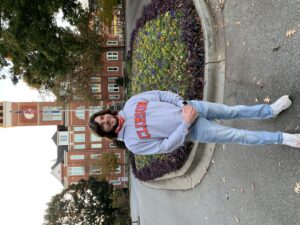 Bryant Thomas
Bryant Thomas
Clemson University freshman, pre-business major
Did covid influence where you decided to go to college?
No. My dad went to Clemson, so I’ve always wanted to go to Clemson.
Where are you living this year?
In a dorm with my roommate. We can only have a limited amount of other people in our dorm. And when they come in, they have to wear a mask. We don’t have any rules with our roommate because we’re around each other so much. But if we have other people in, they have to wear a mask.
What kind of rules or restrictions did you have to follow on campus because of covid?Any building you went into, you had to be wearing a mask. When you were outside, if social distancing couldn’t be guaranteed, you had to wear a mask. You had to make appointments to go into the campus gym or the library.
There weren’t as many dining options. Some of the dining halls were closed because of covid, and there were a lot less food options than there normally would be. For football games, they didn’t give out as many tickets to students, and there was social distancing. I didn’t get to go to any games.
What happened when someone tested positive for covid-19? And did you have to isolate or quarantine for any reason?
Anyone who tested positive for covid-19 at Clemson had to enter 10-day isolation, and his or her roommate had to enter 14-day quarantine, even if they tested negative. I did have to isolate around the beginning of October because I tested positive for covid-19. I had a fever and body aches for about three days, and then a cough and a sore throat for about a week.
Were your classes online or in-person?
Most of them were online. For some, I only went in-person on certain days of the week. I had an economics and a geology class that were all online. My sociology, math and business classes and an entrepreneurial elective were online and in-person. The professors posted video lectures.
How did taking classes online work with a roommate?
We just ignored each other, I guess.
Did finishing high school online help you adjust to online classes in college?
It helped. It was still kind of frustrating, though, having to sit in your dorm all day.
Have you had to adjust your learning style because of online classes?
I think of myself as more of a hands-on learner, and that’s just difficult to do through Zoom. I’ve had to switch to a more visual, auditory learning style.
What were you looking forward to most about going to college?
I was looking forward to being independent, living on my own and making new friends. That’s been a lot harder this year because of covid, but I still found ways to meet new people by getting involved in campus organizations and through my dorm.
I didn’t join a fraternity. I might next semester, but I’m not sure. Because of covid, we’re all hesitant. They can’t really do many events. We would have to go through rush on Zoom. But everyone here is sick of Zoom calls because that’s what we do for most of our classes.
How do you date during covid?
As long as you keep your group small, there isn’t really any problem. And a lot of the businesses and restaurants are still open.
What has been the biggest disappointment or challenge about going to college during covid?
I guess not really being able to go out and do anything. There are, of course, restrictions on gatherings or parties. I only saw a few situations where big groups got busted up. It was frustrating that we couldn’t have people in the dorm or go to class in person.
Was anything better than you expected?
Despite all of the covid, I think the university tried really hard to make this semester as normal as it could be. By not sending us home when our cases went up, that made it easier to go out and make new friends.
Ten, 15 or 20 years from now, how will you look back on this experience?
It’s like being part of history. I think a lot of things are going to change even after covid goes away. If I can live through this, I can make it through anything.
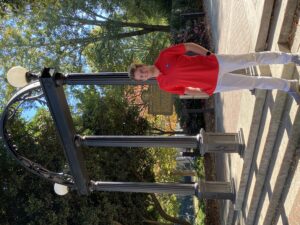 Sanders Hackett
Sanders Hackett
University of Georgia freshman, civil engineering major
Did covid influence where you decided to go to college?
No. I told my mom when I was 4 or 5 years old that I wanted to go to UGA, and that’s what I worked for all throughout school. When I got accepted – worldwide pandemic or not – I wanted to go to UGA.
What kind of rules or restrictions did you have to follow on campus because of covid?
At UGA, the rules are pretty strict. Anytime you’re inside any sort of building, even at the gym, you have to have a mask on. Everywhere is marked off with little dots six feet apart. Anywhere you go, there’s always hand sanitizer and wipes. If you touch something that other people may touch, you wipe it down afterward.
In the dorm, it’s you and your roommate. Other than that, there are no visitors and no guests. Not even people from your own hall are supposed to be in your room.
The meal plan and the dining halls have been one of the biggest changes. When we started school, it was takeout only and the options were limited. The lines were long. Some people dropped their meal plan, but I didn’t.
I give UGA a lot of credit for asking students what they could do to better serve us. It became a more efficient process, and there were some dine-in options. The food variety got much better.
What happened when someone tested positive for covid-19? And did you have to isolate or quarantine for any reason?
When someone tested positive at UGA, they were immediately sent to isolation in a specifically designed dorm for people who test positive for covid-19. They were then given the option to go home or to stay in the isolation dorm. However, they were not allowed to return to campus for a minimum of 14 days after a positive test. This proved to be extremely effective in getting those who tested positive out of the general student body and allowing them to return to full health. I have not had to quarantine or isolate for any reason yet. I been extremely blessed and fortunate that I have been able to stay healthy.
Were your classes online or in person?
I had two classes that met in-person once a week and one that met in-person every other week. The other two were online. Calculus and world geography were online. I took two different introductory engineering courses. One met in-person once a week, and the other one met in-person every other week. My public speaking class met in-person once a week.
How did taking classes online work with a roommate?
That was one of several struggles we had. Luckily for us, we only had one class at the same time. We usually weren’t trying to do Zoom classes at the same time. It was a lot of headphones in and “please be quiet” from the other side of the room.
Did finishing high school online help you adjust to online classes in college?
As terrible as it is and was – yes. The way that we had to end high school in an online forum, it did help with the transition to online classes in college. For me, it helped with time management for online classes. You don’t have to go to class every single time it meets, but there are still deadlines for quizzes, tests and other assignments.
Have you had to adjust your learning style because of online classes?
Yes. I like being in-person and having that interaction with the teachers. I like being able to ask questions or go up to them after class.
What were you looking forward to most about going to college?
I envisioned I would be living out my dream and participating in some of the great things Athens has to offer – dorm life, going to football games and making new friends. I have been able to do some of that, but not on a large scale.
I have gotten involved in Greek life. I joined Theta Chi, and we were able to have some small events as long as we followed all of the state rules and school rules and regulations.
But with covid, I knew that the social aspect was going to be hard. I had prepared myself for this and for the challenge of earning a degree.
I also am employed part-time at RW Allen as an intern in project management and estimating. I carried that piece of home with me, but we have limited in-person interaction.
How did you go through rush?
It was a lot different. There were not any big events. When we did the house tours, everybody had to wear their masks. Only a limited number of people could be in a house at one time. We had to social distance for everything.
How did covid affect your social life?
It tore apart my social life. I am an extremely, extremely social person. I haven’t had some of the social gatherings I thought I would have when I came to college. It has affected going on trips.
I have only been to two football games, and it was very, very different. I’ve been to UGA games all my life. I’m used to being there with 100,000 people. It’s usually loud with lots of energy. It’s hard to recreate that same experience with only around 20,000 people there.
How do you date during covid?
It’s tough. I’m not going to lie. My roommate has a girlfriend, but they have been dating a long time. You can’t date traditionally. There are not as many opportunities to go out to eat or go to a football game. There are limited social opportunities right now.
What has been the biggest disappointment or challenge about going to college during covid?
For me, I’m a very social person. There have not been very many social events or as many social gatherings as we would normally have. It’s been nothing like what I used to hear about from my other friends or when I would visit. That has been the hardest aspect for me.
Has anything been better than you expected?
The bathrooms in my dorm. Friends had told me the bathrooms are awful. I’m not saying they’re nice, but they are not as awful as everyone made them out to be.
Ten, 15 or 20 years from now, how will you look back on this experience?
That’s a tough question. Looking back on it, I hope I’ll be able to say I made the best out of the situation. I want to be able to say I had a good, positive freshman year, but I also followed the rules and regulations that are in place.
Everybody here understands that we all want to have a good time, and we all want to be able to have the normal freshman experience. But we’re not able to do that right now. The only way to get back to normal is to follow the guidelines and rules from the government and the school.
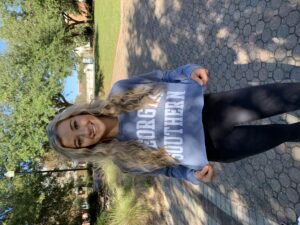 Grace O’Neal
Grace O’Neal
Georgia Southern University freshman, nursing major
Did covid influence where you decided to go to college?
Not really. It hasn’t made me change my mind about my major, either. Not yet, anyway.
What kind of rules or restrictions did you have to follow on campus because of covid?
We always had to wear a mask on campus and in class or when we went in any building. We were not allowed to have any visitors in our dorms. We had limited capacity in our classrooms, and it was optional for us to go to class in-person. If we were uncomfortable, we could go on Zoom for our classes.
What happened when someone tested positive for covid-19? And did you have to isolate or quarantine for any reason?
We have an online Georgia Southern portal with a CARES (Covid-19 Answers Resources Evaluation and Self-reporting) Center, where we were supposed to report our sickness and let our professors know. The dining hall had to-go boxes, and you were allowed to get two of them. So, if your roommate was sick, you could get one for them.
For the first couple of weeks of school, most of the people I know had covid, including me and my roommate. We had it at the same time. It wasn’t that bad. The only thing that happened to me was I lost my taste and smell, but we couldn’t do anything then.
Were your classes online or in-person?
I had three classes in-person – universal justice, government and English. One was only half a semester, though. I took chemistry and a first-year experience class that all freshmen have to take online.
How did taking classes online work with a roommate?
In our dorm, we each have our own room. I could sit in my room and shut the door.
Did finishing high school online help you adjust to online classes in college?
To a certain extent. It made me realize that I had to wake up every day and see what I had to do. At the end of our senior year in high school, they were pushing us across the finish line. It has been a lot harder in college, though. The load of work is definitely a lot more, and it’s a lot more difficult.
Have you had to adjust your learning style because of online classes?
I definitely have had to adjust my learning style due to online classes. I’ve had to get used to emailing my professors often with questions and figuring out a lot of things on my own by googling videos to explain topics I don’t understand.
What were you looking forward to most about going to college?
I was really excited to get away from home, branch out and meet new people, and live on my own. I have been surrounded by the same people my whole life.
What was reality like?
At first it was super difficult because of covid. I didn’t get to meet as many people as I thought. Over time, things got better, and I met new people. I’m in a sorority, but we weren’t getting to do anything at first. Later we could do more activities, but we had to have our masks on.
I joined ADPi, and we did rush on Zoom calls the whole week. We had a different Zoom call for each sorority every day.
How do you date during covid?
I have a boyfriend, so I’ll go to his house and hang out there and eat dinner there. Most of the restaurants in town are still open, so we can go out to eat.
What has been the biggest disappointment or challenge about going to college during covid?For me, I wanted to rush, and I was really excited about the things we would get to do with our sorority. But we haven’t been able to do much. And my parents can’t really come to visit me.
Has anything been better than you expected?
The number of friends I have been able to make has been better than I expected. I wasn’t sure I would be able to meet new friends at first.
Ten, 15 or 20 years from now, how will you look back on this experience?
It’s definitely going to be something I’ll remember. I’m glad I’ll have this story to tell that I was a freshman in college and a senior in high school during covid. Those are two really big years, and covid has altered them.
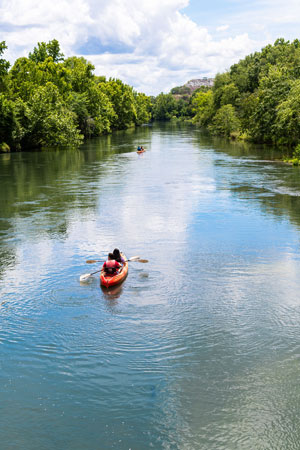 Outdoor recreation, job growth, affordable housing and quality of life — according to Money magazine, Martinez means all of these things. The magazine has ranked Martinez as one of its 50 Best Places to Live in 2021-22.
Outdoor recreation, job growth, affordable housing and quality of life — according to Money magazine, Martinez means all of these things. The magazine has ranked Martinez as one of its 50 Best Places to Live in 2021-22. 
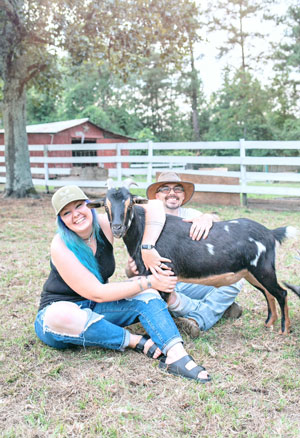
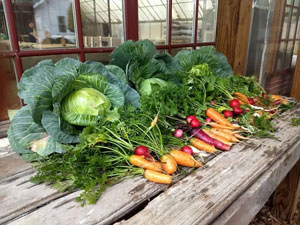 Whether they’re taking care of crops or animals, women are making their mark in farming.
Whether they’re taking care of crops or animals, women are making their mark in farming.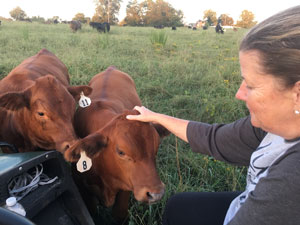 Tink’s Grassfed Beef
Tink’s Grassfed Beef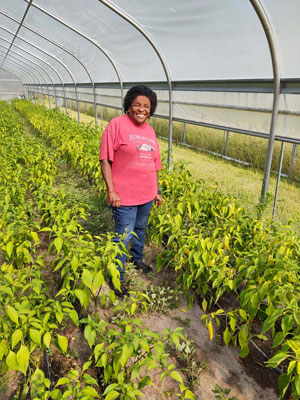 Brown’s Place Farm
Brown’s Place Farm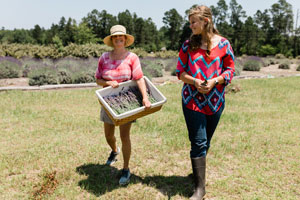 White Hills Farm
White Hills Farm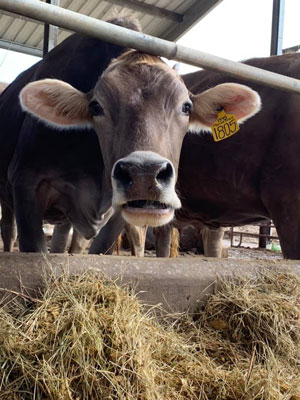 Southern Swiss Dairy
Southern Swiss Dairy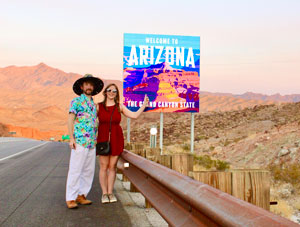
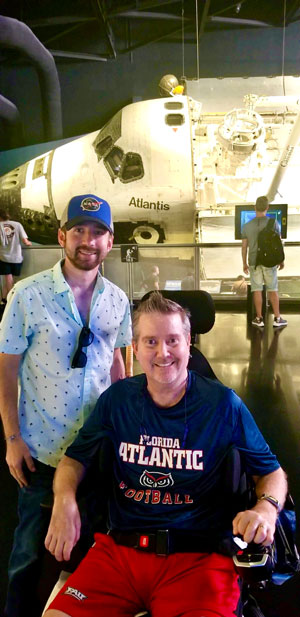 Typically, onset of the disease is gradual, and initial symptoms vary in different people. They can begin in the muscles that control speech and swallowing or in the hands, arms, legs or feet.
Typically, onset of the disease is gradual, and initial symptoms vary in different people. They can begin in the muscles that control speech and swallowing or in the hands, arms, legs or feet.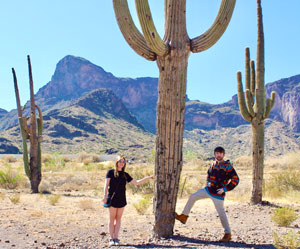 To do his part, Herzberg wanted to find a way to raise money and bring awareness to the rare disease. So, armed with a rented van, a tripod and a sense of adventure, he and his girlfriend, Bethany Marshall of Martinez, went on a two-week, cross-country road trip from Martinez to San Diego and back last October.
To do his part, Herzberg wanted to find a way to raise money and bring awareness to the rare disease. So, armed with a rented van, a tripod and a sense of adventure, he and his girlfriend, Bethany Marshall of Martinez, went on a two-week, cross-country road trip from Martinez to San Diego and back last October.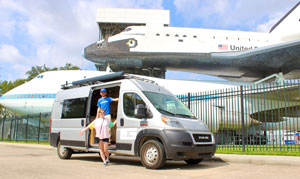 “People are very warm-hearted. Once they saw the ALS sticker on the side of the van, they wanted to know what we were doing,” says Herzberg. “A lot of people on Instagram would randomly contribute, too.”
“People are very warm-hearted. Once they saw the ALS sticker on the side of the van, they wanted to know what we were doing,” says Herzberg. “A lot of people on Instagram would randomly contribute, too.”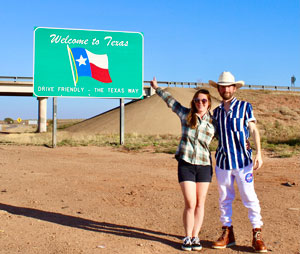 Herzberg has not stopped raising money for ALS. The couple hit the road again this past summer, traveling 2,000 miles to Niagara Falls and back. Along the way, they stopped in Pittsburgh on June 2 for Major League Baseball’s inaugural Lou Gehrig Day to watch the Pirates take on Lang’s favorite team, the Miami Marlins.
Herzberg has not stopped raising money for ALS. The couple hit the road again this past summer, traveling 2,000 miles to Niagara Falls and back. Along the way, they stopped in Pittsburgh on June 2 for Major League Baseball’s inaugural Lou Gehrig Day to watch the Pirates take on Lang’s favorite team, the Miami Marlins.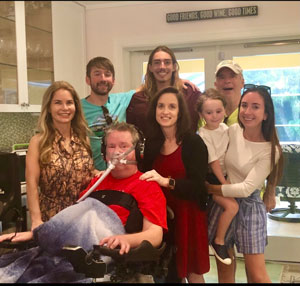 Herzberg and Marshall have visited more than 20 states since October, and they plan to schedule another fundraising trip to South Dakota. And he still finds time to visit Lang in Florida every couple of months and keep him up-to-date on the Drive Away ALS fundraising efforts.
Herzberg and Marshall have visited more than 20 states since October, and they plan to schedule another fundraising trip to South Dakota. And he still finds time to visit Lang in Florida every couple of months and keep him up-to-date on the Drive Away ALS fundraising efforts.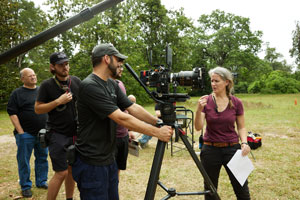



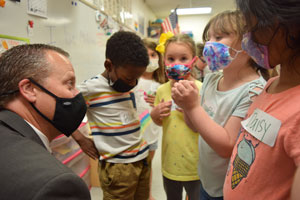
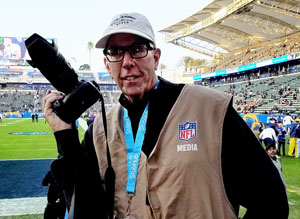
 “I wanted it to be a book of older photos. I didn’t want any from nowadays,” Lester says. “The old photos are the ones I like. I could never get those pictures again. The access I had then, nobody has now.”
“I wanted it to be a book of older photos. I didn’t want any from nowadays,” Lester says. “The old photos are the ones I like. I could never get those pictures again. The access I had then, nobody has now.”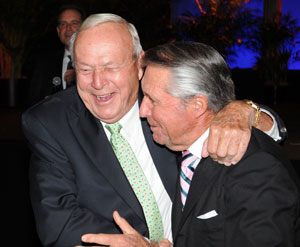 Inside the Ropes
Inside the Ropes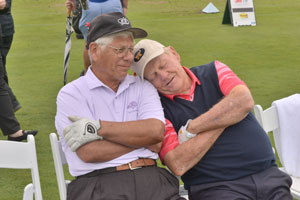 Taking photos at charity golf events, Lester thought there might be a better way to make a living. At the fundraisers, he photographed foursomes, which included a celebrity and his playing partners, on the tee. He charged each golfer $5 for a 5×7 print and mailed it to them.
Taking photos at charity golf events, Lester thought there might be a better way to make a living. At the fundraisers, he photographed foursomes, which included a celebrity and his playing partners, on the tee. He charged each golfer $5 for a 5×7 print and mailed it to them.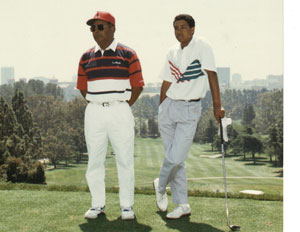 In the late 1970s and early 1980s, Lester started photographing PGA Tour events for Stan Wood, the former University of Southern California golf coach who had started his own public relations firm for the pro tour. He also started shooting for the LPGA, and he has fond memories of photographing the likes of Nancy Lopez, Patty Sheehan and Pat Bradley.
In the late 1970s and early 1980s, Lester started photographing PGA Tour events for Stan Wood, the former University of Southern California golf coach who had started his own public relations firm for the pro tour. He also started shooting for the LPGA, and he has fond memories of photographing the likes of Nancy Lopez, Patty Sheehan and Pat Bradley.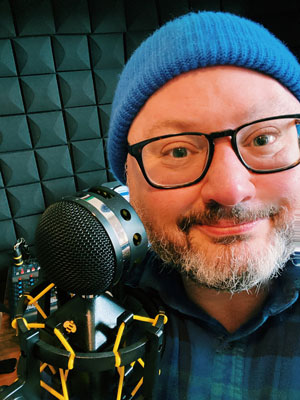
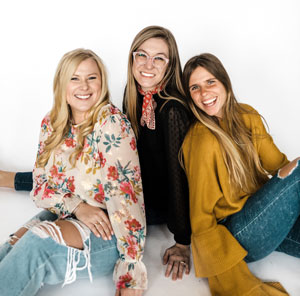
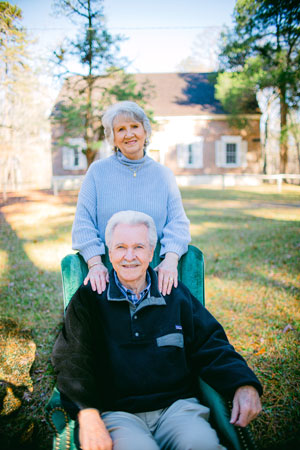
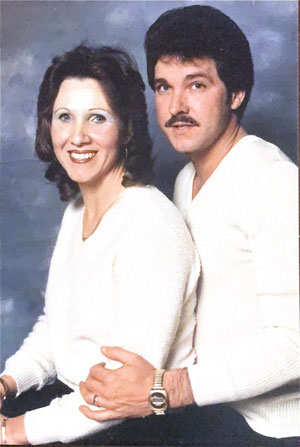
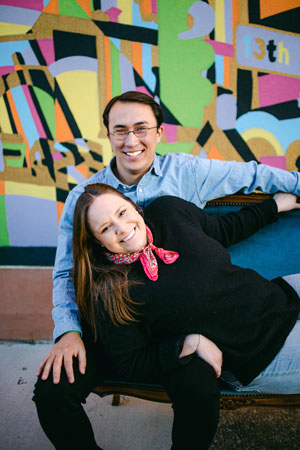
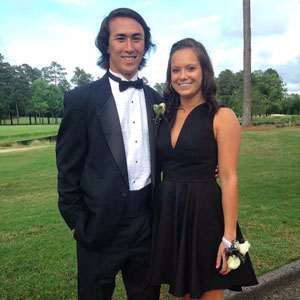
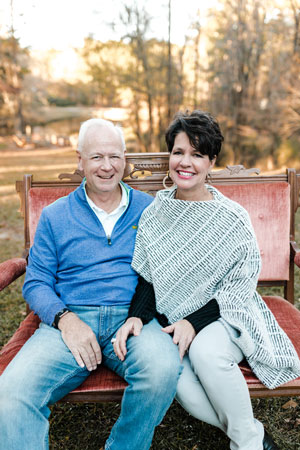
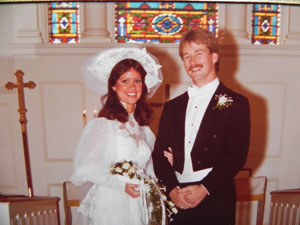





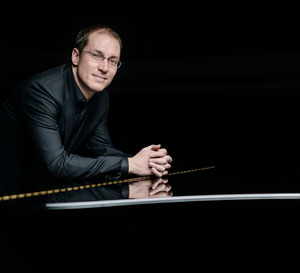
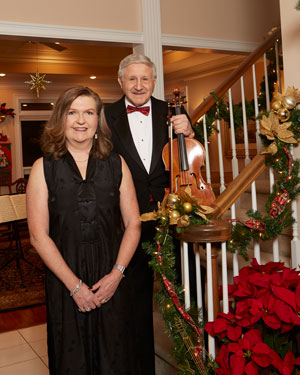
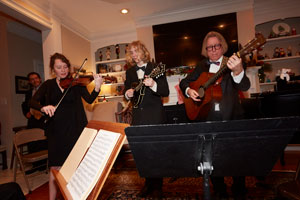 Traveling Show
Traveling Show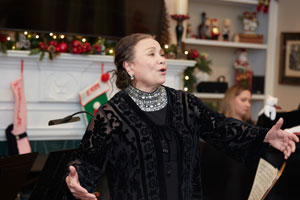 They took their party with them when they moved to Bethesda, Maryland and Jacksonville, Florida, where Paul played in their symphonies.
They took their party with them when they moved to Bethesda, Maryland and Jacksonville, Florida, where Paul played in their symphonies.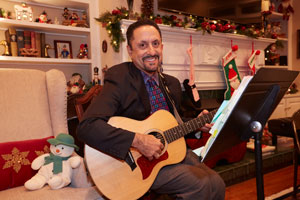 The Dainers settled in Evans in 1992, and they started hosting their annual Christmas party here the following year. Until this December, they had skipped the party only three times – the years they moved to Evans and Greenville and in 2009 when they had to cancel it after Paul had an accident a couple of days before the event. In 1982, the party was subdued after Monica had a miscarriage the night before and a heavy snow fell on the day of the party.
The Dainers settled in Evans in 1992, and they started hosting their annual Christmas party here the following year. Until this December, they had skipped the party only three times – the years they moved to Evans and Greenville and in 2009 when they had to cancel it after Paul had an accident a couple of days before the event. In 1982, the party was subdued after Monica had a miscarriage the night before and a heavy snow fell on the day of the party.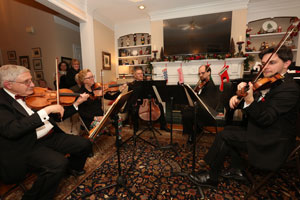 Strings Attached
Strings Attached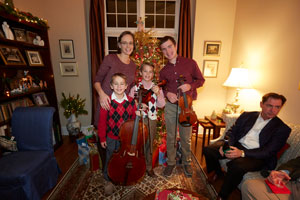 Monica, a former nurse who now presents programs at the USC Aiken DuPont Planetarium, also has been active with Augusta Players as a performer and board member. “Through my connections with that organization, we have invited a number of very talented singers over the years,” she says. “And we always like to invite children and young people as guests and performers.”
Monica, a former nurse who now presents programs at the USC Aiken DuPont Planetarium, also has been active with Augusta Players as a performer and board member. “Through my connections with that organization, we have invited a number of very talented singers over the years,” she says. “And we always like to invite children and young people as guests and performers.”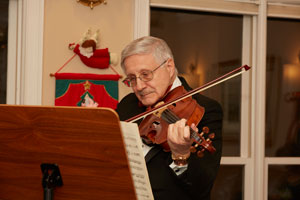 Mark Dickens, who has played the piano and organ in many area churches, and Stacy Reynolds, who has played piano for local musical theater groups and contemporary Christian music for churches for decades, also played the piano at last year’s party.
Mark Dickens, who has played the piano and organ in many area churches, and Stacy Reynolds, who has played piano for local musical theater groups and contemporary Christian music for churches for decades, also played the piano at last year’s party.